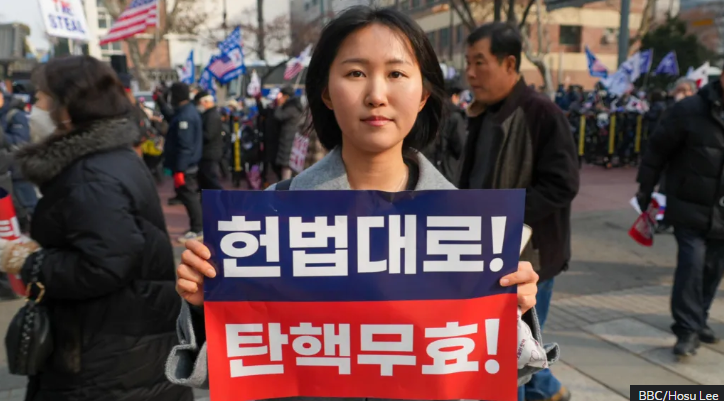
On a frigid January afternoon, pharmacy student Shin Jeong-min stood anxiously outside South Korea’s Constitutional Court. Inside, the country’s suspended president, Yoon Suk Yeol, was fighting his impeachment.
As Yoon testified, hundreds of his fervent supporters, including Jeong-min, chanted for his release. Their rallying cries echoed: “Release him now! Cancel his impeachment!”
The Conspiracy Theory Fueling the Movement
Jeong-min, just 22 years old, is an anomaly among the predominantly elderly conservatives at the protest. Yet she passionately subscribes to a conspiracy theory that has taken root among Yoon’s most ardent followers—that if the opposition leader is elected, South Korea will merge with North Korea and fall under Kim Jong Un’s rule.
This belief is deeply ingrained in the country’s older generations, who lived through the Cold War and still bear memories of the devastating Korean War. Yoon, who attempted to declare martial law in December, played on these fears to justify his power grab, claiming—without evidence—that “North Korean communist forces” had infiltrated the opposition party and sought to overthrow the government.
Martial Law and the Rise of Anti-Communist Frenzy
Despite his failed coup, Yoon’s rhetoric has triggered an anti-communist surge among his supporters, bridging generational gaps. Even those who previously paid little attention to North Korea or communism now believe South Korea is teetering on the edge of a leftist dictatorship.
“This is a war between communism and democracy,” declared one office worker in his 40s, who left work early to protest at the court.
“The president must be reinstated immediately. He’s the only one who can arrest all the North Korean spies,” argued a demonstrator in his 30s.
Historically, these fears weren’t unfounded. In the 1960s and 70s, North Korean spies frequently attempted to infiltrate the South. A dramatic assassination attempt on then-President Park Chung-hee in 1968 left bullet marks on Seoul’s Bugak Mountain. During South Korea’s military dictatorship in the 1980s, radical student movements praised Pyongyang, fueling government crackdowns on so-called “regime sympathizers.”
However, experts say today’s fears are vastly exaggerated. “Pyongyang’s nuclear weapons and cyber capabilities pose a real threat, but the idea that the opposition wants to unify with North Korea is baseless,” said Shin Jin-wook, a sociology professor at Chungang University.
Exploiting Historical Fears for Political Gain
Many critics argue that Yoon has weaponized anti-communist sentiment for political survival. His conservative People Power Party has historically taken a hardline stance on North Korea, favoring military pressure, while the opposition Democratic Party advocates diplomacy and coexistence.
Since his impeachment, Yoon has claimed—again without evidence—that North Korea, with Chinese assistance, rigged last year’s parliamentary election. “This is fake news cooked up by Yoon to demonize the opposition and justify his undemocratic actions,” Democratic Party lawmaker Wi Sung-lac told the BBC.
Yoon’s claims resonate deeply with his supporters, many of whom cite real historical events as proof of a grander conspiracy. They point to former President Moon Jae-in’s diplomatic meetings with Kim Jong Un and current opposition leader Lee Jae-myung’s alleged involvement in sending funds to North Korea as evidence of leftist collusion.
The Role of China and Far-Right Media in Shaping Public Opinion
Yoon’s rhetoric has also fueled growing distrust of China, with many supporters linking Beijing to alleged election interference. At a recent rally in Seoul, demonstrators replaced their “Stop the Steal” placards with signs reading “Chinese Communist Party OUT.”
“China is interfering in all of South Korea’s political affairs,” insisted 66-year-old protester Jo Yeon-deok. “They’re pulling the strings behind the scenes.”
According to Lee Sangsin, a polling expert at the Korea Institute for National Unification, “A growing portion of the public now believes China wants to turn South Korea into a vassal state.”
For younger South Koreans, China is seen as a more immediate threat than North Korea. A Pew Research Center study found that South Korea and Hungary were the only two countries where younger generations viewed China more negatively than their elders.
“North Korea and China are my biggest concerns,” said 30-year-old IT developer Kim Gyung-joo, who attended a Yoon rally alone. He initially opposed martial law but changed his stance after watching right-wing YouTube channels. “Now, I understand why it was necessary.”
Divisive Politics and the Road Ahead
Despite the fervor of Yoon’s supporters, opposition lawmaker Wi Sung-lac remains confident that the Democratic Party will prevail. “Even though these extreme views are spreading, they will be limited. Most people want a return to normality.”
Polling expert Lee Sangsin is less optimistic. “Yoon’s base is becoming a fast-growing cult,” he warned. “His actions have divided South Korean society in ways that will have lasting consequences.”
